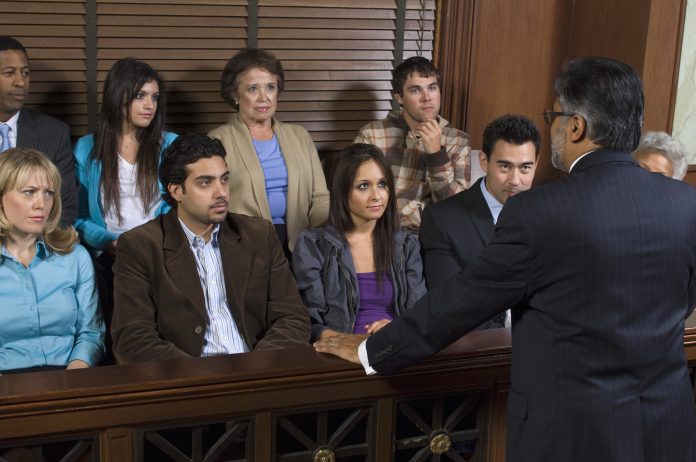Simon Spence, QC at Red Lion Chambers, explains the need for trial by jury in a time of global pandemic
The United Kingdom is currently under siege from the COVID-19 pandemic. We are one of the worst hit countries in the world and all aspects of society are affected by it. Rightly, the focus of national attention has been on the NHS and ensuring it has all it needs to survive. Rather more out of the spotlight though is the criminal justice system, one of the other pillars of a civilised society along with education and security.
Unlike the NHS, which almost everyone has contact with in one form or another, only a small proportion of society experience the criminal justice system and an even smaller proportion experience trial by jury, whether as a victim, witness, juror or defendant. And yet, it is one of the longest standing and most important parts of what makes up our social structure. Its origins stretch back to the signing of Magna Carta in 1215, which first safeguarded what are now called human rights, themselves now enshrined in the Human Rights Act 1998 and in particular the right to a fair trial under Article 6.
So what is a fair trial?
It is one where you are presumed innocent unless your guilt can be proven. It is one that allows you enough time to prepare your defence. It is one where you are entitled to be represented by a lawyer and if you cannot afford to pay, as with the NHS, the state will pay for you to have one. And crucially, it is one where the accused receives a fair and public hearing by an independent and impartial tribunal. That does not of course necessarily mean a jury. About 90% of criminal cases in this country are dealt with in the Magistrates’ Court, where the tribunal is either a bench of three lay justices or a single district judge, a trained, professional lawyer paid by the state, just as a circuit judge is in the Crown Court.
Why then, are we so wedded to the idea of trial by jury? It was once said that ‘trial by jury is the worst system for trying people, apart from all the others’. And as someone who has spent over 30 years practising in the Crown Court, I can only agree. Juries are fair and open minded. They are not overly cynical by ‘having heard it all before’ nor do they jump to pre-conceived conclusions about certain members of our society, a trap into which some judges fall.
But what we have all come to learn during the current pandemic is that sometimes the ‘usual way of doing things’ has to be put on hold for the sake of public health and safety. Why should this not apply to trial by jury, a system where, by definition, you have to have a lot of people in the same room, sometimes in close proximity to each other?

No trial by jury during pandemic?
There are some schools of thought that for a time at least trial by jury should be shelved for the sake of public health. This certainly has the advantage of ‘business as usual’ being restored sooner and helping reduce the growing backlog of cases waiting to be heard, including a significant number of people being held in custody awaiting trial, many of whom may be acquitted: a far from ideal situation.
But what impact will it have on public confidence in the system if people charged with serious offences are tried by a single individual with their prejudices and pre-conceptions all being part of the equation? Of course, they will be required to give a reasoned judgement (which ironically, juries do not) but to my mind, it is a poor substitute for a disparate group of twelve strangers considering the evidence and bringing their collective wisdom and experience of the world to bear on it.
It is this collective approach that to me gives the jury system its strength and we dilute it at our peril. Alternative ways of educating children and even creating temporary hospitals have been thought up. Creative thinking about the criminal justice system too is surely preferable to getting rid of juries.
Another suggestion being proposed is that the size of a jury should be reduced from 12 to 7, a temporary solution used during World War Two. This may be marginally preferable, but is exposing 7 people to the danger of contracting COVID-19 in any way preferable to exposing 12? The modern legal system is very different from that that existed in the 1940s. There was no legal aid then and the trial process was very different: no pre-trial disclosure of evidence, no detailed legal directions to the jury and juries not having as much time as they needed in order to reach their verdicts. And once the number has been reduced for the sake of expediency and cost, will a government, keen to recover economically from the fallout of the pandemic, see the attraction of it as a permanent feature of the system?
Whilst there is hope that COVID-19 will follow the pattern of historical pandemics such as the Spanish and Asian flu and one day come to be under control, nothing is certain. In contrast, the jury system ’12 good people and true’ has existed for centuries and for very good reason. It has been described as many things: ‘the beacon of light that shows democracy lives’, ‘the final bulwark against an oppressive state’ are just two such descriptions. Lofty expressions for 12 ordinary people, you may think. But by no means an exaggeration. If I asked any of my clients whether they wanted to be tried by a judge alone next week or by a jury next year, I suspect I know what their answer would be.











